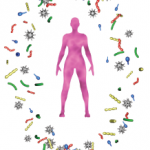Background & Objectives
Rheumatoid arthritis (RA) is a chronic autoimmune disease associated with immune responses to the patient’s own antigens and characterized by inflammation and substantial joint destruction. Prevotella copri, a gut commensal bacterium, has been reported to be an immune-relevant organism in individuals with RA.
This study sought to evaluate antibody responses to anti-P. copri antibody in participant cohorts and to determine when, in the natural history of RA, such responses develop.
The gut microbiota is largely responsible for the modulation of the immune functions that are integral to regulation of inflammation and that, when in disequilibrium, may lead to autoimmune disease. Dysbiosis of the gut microbiota may tip the scales in favor of bacteria that elicit inflammatory and/or autoantibody responses.
Methods
Seifert et al. analyzed serum levels of immunoglobulin A (IgA) and IgG antibodies from a 27-kd protein of P. copri (anti-Pc-p27), an immunogenic P. copri protein, in study participants at risk of developing RA, who transitioned to RA, with early RA (shorter than one year from disease onset) and with established RA, with comparisons to matched controls.
Participants were from the Studies of the Etiology of Rheumatoid Arthritis (SERA) cohort. SERA is a multi-center, longitudinal study that follows individuals at risk for future development of RA, patients with classifiable RA and healthy controls. Both seropositive and seronegative individuals were included.
Results
Overall, participants with RA had significantly higher IgA anti-Pc-p27 antibody levels and trended toward higher IgG anti-Pc-p27 antibody levels than matched controls. When stratified by early vs. established RA, participants with early RA had median IgG anti-Pc-p27 antibody levels that were higher overall. Median IgA anti-Pc-p27 antibody levels were higher in participants with established RA than in their matched controls—a statistically significant finding. In the autoantibody-specific analyses, the at-risk population with anti-cyclic citrullinated peptide (anti-CCP) antibodies, but not rheumatoid factor (RF), trended toward increased levels of IgG anti-Pc-p27.
This study hypothesized that immune reactivity to P. copri may be found in additional RA populations and potentially in individuals at risk of developing RA. At-risk individuals and those with early RA had overall higher levels of IgG anti-Pc-p27 antibodies, and those with established RA had significantly increased levels of IgA anti–Pc-p27 antibodies.
Additionally, statistically significant correlations existed with IgA anti-Pc-p27 antibody responses in the RA groups and higher levels of IgG anti-Pc-p27 in the CCP-positive at-risk participants and in those with early RA. However, P. copri, as identified by Pc-p27 antibody responses, is likely only one of several organisms that may have immune relevance in RA.

